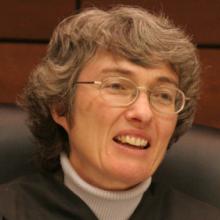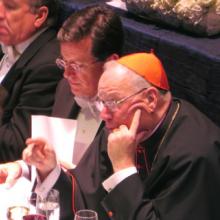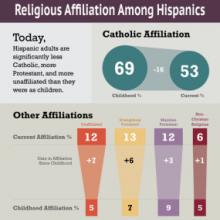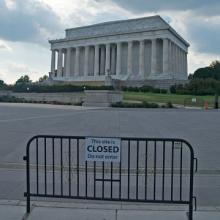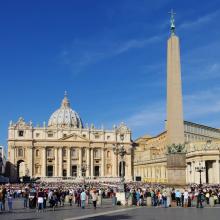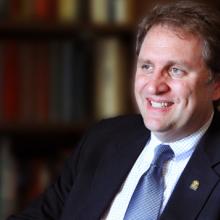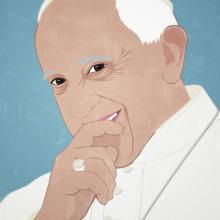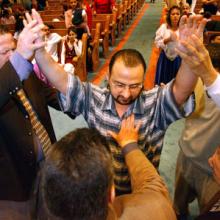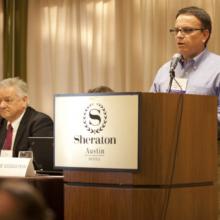Catholic
In November of 1963, C. S. “Jack” Lewis knew he was dying. The Irish-born literary scholar, children’s author, and Christian apologist had come out of a coma in July, only to be diagnosed with end-stage renal failure. He retired from his post at Cambridge University, choosing to die at home in the Kilns, where he lived with his brother, Major Warren (“Warnie”) Lewis.
On Friday, Nov. 22, he retired to his bedroom after lunch. At 4:30 p.m. GMT he took some tea. An hour and a half later, Warnie heard a crash and discovered Jack unconscious. Within three or four minutes, he was dead, exactly one week shy of his 65th birthday.
A few minutes later (11:39 a.m. CST), Air Force One touched down at Love Field in Dallas, Texas, as a motorcade prepared to take President John F. Kennedy and his wife Jacqueline, along with their entourage, to the Dallas Business and Trade Mart. But the motorcade never arrived at its destination.
After the president suffered mortal gunshot wounds to the head at 12:30 p.m., his limousine rerouted to Parkland Memorial Hospital where the 46-year-old president was dead upon arrival.
For the first time in a while, I'm feeling optimistic about the direction of the Catholic church's hierarchy in general and about the office of the papacy in particular. Many authors have written about the plethora of ways in which Pope Francis is hitting the "restart" button for a church so devastated by sexual and financial corruption.
Forgotten, however, is the fact that Pope Benedict XVI had to resign for this breath of fresh air to occur. The pope emeritus deserves recognition for his courageous and humble decision and action. Paradoxically, the conservative pope's nontraditional decision to resign has paved the way for the current pope to begin to mend the broken church structures that have allowed corruption to continue unchecked.
As the U.S. Catholic bishops began their annual fall meeting on Monday, they were directly challenged by Pope Francis’ personal representative to be pastors and not ideologues — the first step of what could be a laborious process of reshaping the hierarchy to meet the pope’s dramatic shift in priorities.
“The Holy Father wants bishops in tune with their people,” Archbishop Carlo Maria Vigano, the Vatican ambassador to the U.S., told the more than 250 American churchmen as he recounted a personal meeting in June with Francis.
The pontiff, he added, “made a special point of saying that he wants ‘pastoral’ bishops, not bishops who profess or follow a particular ideology,” Vigano said. That message was seen as an implicit rebuke to the conservative-tinged activism of the bishops’ conference in recent years.
Almost since his election in March, Francis has signaled that he wants the church to strike a “new balance” by focusing on the poor and on social justice concerns and not overemphasizing opposition to hot-button topics like abortion and contraception and gay marriage — the signature issues of the U.S. bishops lately.
IN THE FOREWORD to Where Justice and Mercy Meet: Catholic Opposition to the Death Penalty, Sister Helen Prejean writes, “Welcome to the pages of this amazing book.” Her hospitable remark is not an exaggeration. I have written articles, taught classes, and spoken to church groups about capital punishment; in my judgment this book is the most accessible resource now available for engaging, informing, and perhaps even transforming how readers view the death penalty.
Where Justice and Mercy Meet was edited by death penalty activist Vicki Schieber, philosopher Trudy D. Conway, and theologian David Matzko McCarthy. The book is the product of two years of interdisciplinary courses, discussions, projects, and research—in sociology, political science, philosophy, economics, theater, ethics, and theology—at Mount Saint Mary’s University in Emmitsburg, Md. While the book has a Catholic focus, it should be useful to Christians of all stripes and others interested in addressing this issue.
The volume is divided into four parts. Through skillful section and chapter introductions and segues, the editors have done a fine job of creating an integrated whole. Relevant questions for discussion and action tips make the book perfect for study groups in churches and for the university classroom.
Part I, “The Death Penalty Today,” exposes the realities of the dominant current method of execution (lethal injection), surveys the history of the death penalty debate in the U.S., and suggests the significance of reading or hearing the stories of those affected by murder and capital punishment. Kurt Blaugher’s chapter, “Stirring Hearts and Minds,” meditates on the role of drama in allowing these stories to capture and broaden our imagination, to stimulate reflection, and to compel us to take action for social change. Indeed, stories—from real life as well as from film and literature—surface throughout the volume, with the most moving and memorable ones being the experiences and voices of those whose loved ones were murdered.
The Archdiocese of St. Louis is putting an end to alcohol sales at youth-related events.
Under a new policy that goes into effect Friday, drinking will not be allowed at any event that is directed primarily toward minors.
That means parents will no longer be allowed to throw back a few beers during their kids’ soccer, volleyball, and softball games. And athletic associations will no longer rake in revenue from beer sales at their concession stands.
While the first months of Pope Francis’ pontificate have been marked by his attention to the poor and his “Who am I to judge” attitude on homosexuality, his pledge to tackle the ban on Communion for divorced and remarried Catholics could have the biggest impact for Catholics in the pews, especially in the U.S.
The current policy has caused what some call a “silent schism,” and bishops around the world concede that the ban has alienated untold numbers of Catholics and their families.
“I think this is the moment for mercy,” Francis told reporters when asked about remarried Catholics during a wide-ranging news conference on the plane back to Rome from Brazil in July.
Like the gay issue, Francis seems to favor a more pastoral approach to the equally perplexing question of “invalid” marriages — couples who remarry outside the church without getting an annulment, or those who do not get married in church in the first place.
A group of Catholic monks can continue selling their handmade caskets after the U.S. Supreme Court declined to hear an appeal from Louisiana funeral directors.
“We really can now move forward without worrying about being shut down,” said Deacon Mark Coudrain, manager of St. Joseph Woodworks in Covington, La. “This is going to affect a lot of other people. A lot of people are going to have opportunities to do things that are their legal right to generate revenue.”
In a little-noticed ruling on Oct. 15, the Supreme Court declined to hear the case between the brothers of St. Joseph Abbey and the Louisiana State Board of Embalmers and Funeral Directors.
The judge who declared same-sex marriage legal in New Jersey was raised a Catholic in Bayonne, a place where the locals still use their church — not their neighborhood — to define where they’re from.
Judge Mary Jacobson graduated in 1971 from Holy Family Academy, a since-shuttered all-girls Catholic high school near her home.
“In Bayonne, you identified yourself by your parish,” said Thomas Olivieri, a retired Superior Court judge in Hudson County and a Bayonne native. “Mary’s family was from St. Mary’s parish. Ours was from St. Vinny’s. We’re both very proud of where we came from.”
The great and the good — and lots of politicians and TV pundits, too — gathered Thursday to hear comedian Stephen Colbert roast and toast everyone from Pope Francis to his host for the evening, Cardinal Timothy Dolan.
The 68th annual Al Smith Dinner, named for the first Catholic presidential candidate in American history, at the Waldorf Astoria hotel raised $3 million for New York’s neediest children.
Colbert is a lifelong Catholic, a man who is, as Alfred E. Smith IV said in introducing him, “serious about both his craft and his Catholic faith.” The cardinal — who is also pretty funny — and the comedian first met last fall, and Colbert had Dolan on his show last month. So the archbishop of New York returned the favor by having Colbert headline the dinner.
The number of Hispanic-Americans who say they adhere to no religion is growing and now rivals the number of Hispanic evangelicals, a new study has found.
The share of Hispanics living in the U.S. who say they are atheist, agnostic, or have no religious affiliation has reached 12 percent, according to the 2013 Hispanic Values Survey conducted by the Public Religion Research Institute. That is double the rate reported in 1990 by the American Religious Identification Survey.
Researchers say Hispanic “nones” are now statistically equal to the number of U.S. Hispanic evangelical Protestants — 13 percent — and warn of a religious divide in the Hispanic community that will be felt for decades to come.
As the government shutdown enters its second week, some religious groups are starting to feel the pinch, and they’re also finding ways to reach out.
More than 90 Catholic, evangelical, and Protestant leaders have signed a statement rebuking “pro-life” lawmakers for the shutdown, saying they are “appalled that elected officials are pursuing an extreme ideological agenda at the expense of the working poor and vulnerable families” who won’t receive government benefits.
Starting Wednesday, evangelical, Catholic, and mainline Protestant leaders will hold a daily “Faithful Filibuster” on Capitol Hill with Bible verses on the poor “to remind Congress that its dysfunction hurts struggling families and low-income people.”
They taught English, gym, music, and fifth grade, and are typically described as “beloved” by their students.
But that didn’t stop the Catholic schools where they worked from firing these teachers for their same-sex relationships, or, in one woman’s case, for admitting that she privately disagreed with church teaching on gay marriage.
A recent spate of sackings at Catholic institutions — about eight in the past two years — is wrenching for dioceses and Catholic schools, where some deem these decisions required and righteous, and others see them as unnecessary and prejudicial.
The special committee of eight cardinals created by Pope Francis with the goal of dramatically reforming the Vatican’s governance got off to an “encouraging” start, the Vatican’s chief spokesman said Wednesday, with a warning not to expect regular updates.
The Rev. Federico Lombardi said Francis met with the so-called Gang of Eight, or the Vatican G-8, on Tuesday and Wednesday to seek their counsel on possible reforms ranging from pastoral work with families and the role of the laity to the prickly issue of tackling the Vatican bureaucracy.
Pope Francis has once again given a startlingly candid interview that reinforces his vision of a Catholic Church that engages the world and helps the poor rather than pursuing culture wars, and one “that is not just top-down but also horizontal.”
The pope’s conversation with Eugenio Scalfari, an atheist and well-known editor of the Italian newspaper La Repubblica, took place at the pope’s residence in the Vatican guesthouse on Sept. 24 and was published on Tuesday.
His newest bombshell come just two weeks after the publication of the pope’s lengthy, groundbreaking interview with a Jesuit journalist in which Francis said the church was “obsessed” with a few moral issues, like abortion and homosexuality, and needed an “attitude” adjustment if it hopes to strike a “new balance” in its approach to the wider world.
Christians and Jews are mounting campaigns for and against a path to sainthood for British writer G.K. Chesterton (1874-1936), one of the world’s best-known Catholic converts.
Roman Catholic Bishop Peter Doyle of Northampton, where Chesterton lived and worked, has ordered an examination of Chesterton’s life — the first step in what is likely to be a long and unpredictable process toward canonization.
Popes John Paul II and John XXIII will be formally declared saints on April 27, 2014, the Vatican said Monday. Pope Francis made the announcement during a meeting with cardinals gathered in Rome.
John Paul, who was pope from 1978 to 2005, and John, who reigned from 1958 to 1963, are considered two of the most influential religious leaders in the world in the last century, and they represent two poles in Roman Catholicism — John XXIII is a hero to liberals, while John Paul II is widely hailed by conservatives.
Are the media pulling their punches when it comes to Pope Francis?
Whether it’s because he carries his own bags or cold-calls troubled Catholics who write to him, or because he so clearly loves interacting with crowds or drives a beat-up Renault around the Vatican, it’s hard to tell. But at some point, much of the world’s media fell for the new pope.
Now an increasing number of Vatican insiders are asking whether the largely positive view of Francis affects the way the media cover the Holy See.
A new survey of Hispanic political and religious values finds they’re overwhelmingly Democrats who hold a largely negative view of the Republican Party.
The 2013 Hispanic Values Survey of 1,563 Hispanic adults was conducted online in both English and Spanish between Aug. 23 and Sept. 3. It has a margin of error of plus or minus 3.7 percentage points.
The survey found that most Hispanics are delighted with Argentine-born Pope Francis, but they hold slightly less favorable views of the Catholic Church. While nearly 69 percent look favorably on the pope, only 54 percent see the institution in a favorable light.
The Christian mission field “is a magnet” for sex abusers, Boz Tchividjian, a Liberty University law professor who investigates abuse said Thursday to a room of journalists.
While comparing evangelicals to Catholics on abuse response, ”I think we are worse,” he said at the Religion Newswriters Association conference. But it’s harder to track.
“Protestants can be very arrogant when pointing to Catholics,” said Tchividjian, a grandson of evangelist Billy Graham and executive director of Godly Response to Abuse in the Christian Environment (GRACE), which has investigated sex abuse allegations.
Catholic military chaplains cannot be forced to witness or bless a same-sex marriage, nor are they allowed to take part in any marriage counseling retreats that are open to gay couples under new rules issued by the Archdiocese for the Military Services.
The rules, sent to chaplains on Sept. 18 by Archbishop Timothy P. Broglio, head of the AMS, also bar chaplains from taking part in a funeral for a Catholic if that participation “would give the impression that the church approves of same sex ‘marital’ relationships.”
But the new rules also set out conditions that would allow Catholic military commanders to comply, without violating their beliefs, with rules giving same-sex couples under their command federal employee benefits as required by law.






